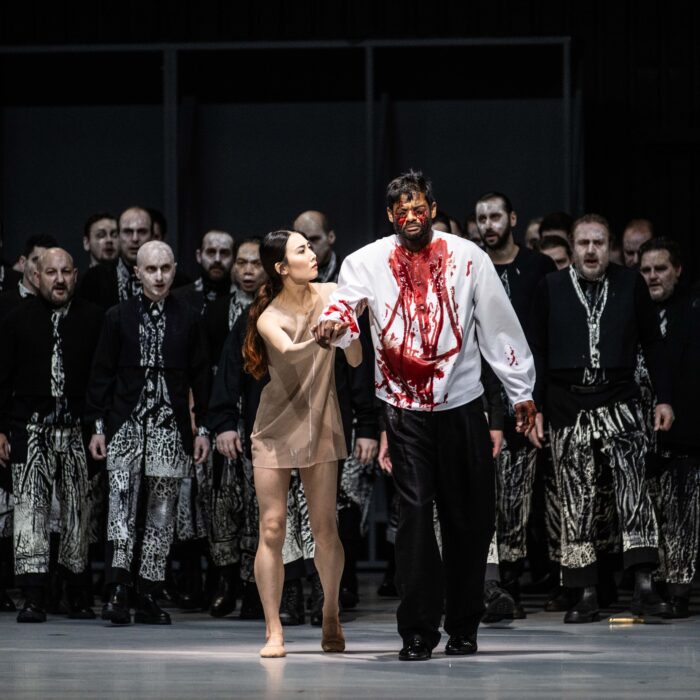
Chicago Opera Theater 2017-18 Review – The Consul: Menotti’s Opera Given Harrowing Production Featuring Patricia Racette
By Marjorie M. Rusche
The Chicago Opera Theater mounted a harrowing production of Gian Carlo Menotti’s “The Consul” November 4, 2017, at the Studebaker Theater in Chicago’s Fine Arts Building. A co-production with Long Beach Opera, “The Consul will continue its Chicago run November 10 and 12. “The Consul” had a Philadelphia premiere in 1950 (when the post-WWII cold war was chilling the international atmosphere), an eight-month Broadway run in New York City, and won the Pulitzer Prize for Music in 1950 and the Drama Critics Circle award in 1954.
In the words of composer/librettist Menotti, “’The Consul’ is a modern expression of a theme as old as the world.” The family of political dissidents Magda and John Sorel can’t freely and peaceably live within their country, and they also can’t legally leave it. To give a further focus on the contemporary immigration issue, moving personal stories of immigrants involved with the opera’s performance and production were posted on placards in the lobby.
1920s Flavor
The first act’s inventive and slightly askew scenic design by Alan E. Muraoka had the flavor of the 1920s German Expressionist silent movie “The Cabinet of Dr. Caligari.” The disproportionate height of the Secretary’s desk at the consulate intensifies the power disparity between the bureaucracy and the immigrants, reinforced by a laser-like beam of light (a condensed searchlight?) by lighting designer David Martin Jacques.
Not a lot of hope present for the characters in this opera, but a plea for a better existence is eloquently expressed in the beautiful ensemble by the petitioners waiting in the consulate at the end of Act one: “In endless waiting rooms the hour stands still. The light goes pale and thin, the heart is dead. We wait in wide-eyed sleep. What are we waiting for? Perhaps the creaking of a door or the light play on the wall. We wait forever, wait. The answer comes too late or death too soon. Oh give us back the earth and make us free. It is God’s gift to me this everflow’ring earth. Oh, let all flags be burned and guilt be shared. My brother’s shame be mine and his my fare. Why must we wait in crowded rooms while aimlessly are spun the wasted suns and forgotten moons? Oh leave the doors unlocked and light the lamps within. Oh, give us back the earth and make us free.”
Lovely Music Making
Another lovely, melodically memorable ensemble occurs in Act one at the initial leavetaking of Magda Sorel (Patricia Racette), John Sorel (as portrayed by Justin Ryan) and Mother (Victoria Livengood): “Now, O lips, say goodbye.” Some necessary comic/ironic relief is given in the show by a short duet from the Secretary (Audrey Babcock) and Vera Boronel, “All the documents must be signed,” as well as the Magician’s tour de force of hypnotizing the supplicants into believing the consulate’s office is really a ballroom. Would that he could hypnotize the Secretary into granting them visas.
The staging by Andreas Mitisek and conducting by Kristof van Grysperre clearly delineated the opera. A particularly effective moment was Vera Boronel’s literally walking up the sides of the Secretary’s ziggurat desk in order to sign her papers. There is a staging twist at the end of the final Act three. (I’ll leave that for you to discover while attending the opera). A few intonation issues in the mid and low brass cleared up as the evening progressed.
Beautiful singing throughout most of the cast. Magda Sorel, as portrayed by Patricia Racette, showcased an impassioned aria at the end of Act two, “To this we’ve come: that men withhold the world from men. No ship nor shore for him who drowns at sea. No home nor grave for him who dies on land.” Alas, this special visitor is revealed to be the sinister Secret Police (Cedric Berry) who is now in collusion with the unseen consul.
The Secretary, as portrayed by Audrey Babcock, did a terrific job in portraying every vocal and dramatic nuance of her part. She moved the audience by saying or singing one word “Next.” Her character develops from initial officious indifference to empathetic active involvement in Magda and John Sorel’s plight. Alas, it was too little, too late. Let that not be us, here, today.


